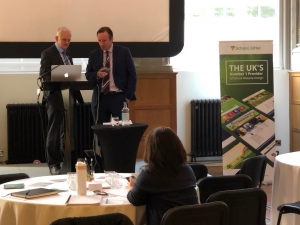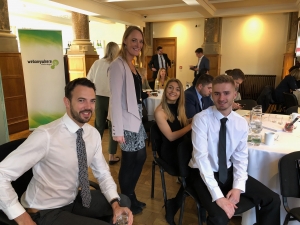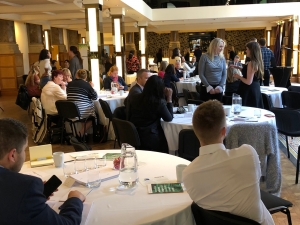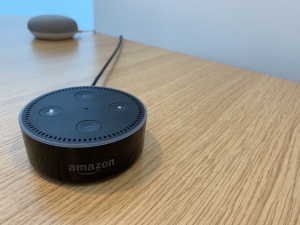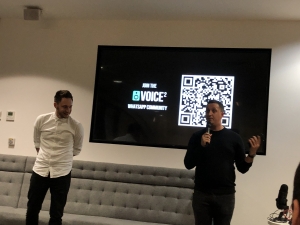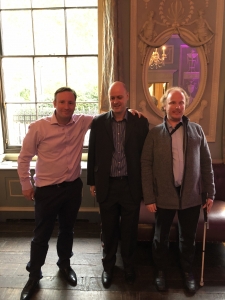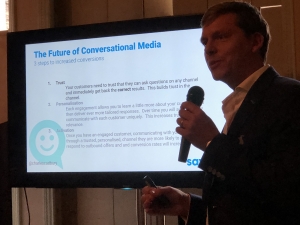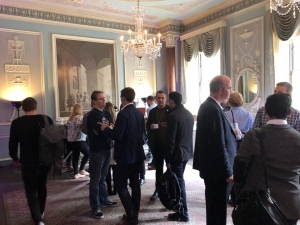We have just hosted a fantastic event at Aspire in Leeds with Professor Stephen Peters the bestselling author of “The Chimp Paradox” book.
The brain has three main component parts. The chimp, the computer and the human. In real life it takes five human beings to pin down a chimp. Similarly, the chimp part of the brain is hard to control. Clearly, children with underdeveloped brains find it harder to control the chimp but this can be learned over time.
If emotional intelligence and calm centred leadership are important for success then it’s easy to understand why Professor Steven Peters has helped a number of famous sports celebrities and international sports teams.
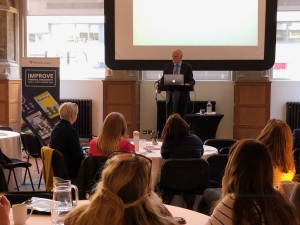
Professor Steven Peters Key Note on Why Children’s Mental Health is more important than Academic Achievement
Professor Steven is himself a humble man that served as the Dean at the School Of Medicine at Sheffield University for 30 years. His moving into working with sports teams was by accident when he was approached by a cyclist who had a friend with mental health issues.
Professor Peters isn’t actually interested in sport and doesn’t watch TV. But he is interested in people and this has been his lifelong vocation.
Profoundly during Professor Steven Peters talk about why mental health is more important than academic achievement he made a salient point. When you are on your deathbed and you’re talking to people they never mention what they have achieved they only ever mention memories of loved ones and have sometimes regrets of why they haven’t been happier or had more fun.
All human beings are unique and we are born with genes. These genes determine whether we have a calm nature or let’s say we are a little bit hot-headed. This was exemplified by the playing of the video showing two dogs eating ice cream from the cone. Initially, you feel sorry for one of the dogs because they seem to be left out. After one dog licks the ice cream gently and the other dog is left out all of a sudden the cone is gone and no more ice cream is left. One of the dogs quite simply could not control their chimp!
Mental health, especially with young people, has far reaching consequences. The root causes of mental health are complex but topics such as exam stress, social media and financial hardship at home can impact the lives of young people.
The important time for brain development is through the years 0 to 5. During a child’s early development, parents need to show love and stability. The brain actually doesn’t stop fully developing until the age of 32 which probably explains some of the irrational decisions made by teenagers and young people in their 20s.
By understanding the mind and how it works, both teachers and children can be better supported. A good example of how you can control your chimp is when you’re at the traffic lights in your car and the light is on amber. Do you amber gamble? When you drive ahead your chimp is winning the battle and this can have far reaching consequences.
Professor Steven Peters was faced with a patient who has done just that. His patient had driven through the traffic lights only to kill a young person. Steven goes on to make the point that we are risking far too much by not controlling our brain.
Again, when adults are dieting the human part of the brain is agreeing to the good reasons why we should do it, quite often the chimp will win out by forcing us into a restaurant to eat a burger. It’s mind over matter. We need to remove the emotions and commit the time to what we want to achieve.
A good tactic for ensuring that we beat the chimp, for example, is to agree to do a sporting activity with a friend. If we don’t like letting our friends down then we will turn up for that run and beat the chimp.
Following the worldwide success of “The Chimp Paradox”, further books have been released by Professor Steve Peters. These books include “The Silent Guides” and “My Hidden Chimp”. My Hidden Chimp is particularly aimed at children.
You can learn more about Professor Steven Peters work here:
You can also listen to this short podcast
Why Mental Health is more important than Academic Achievement
